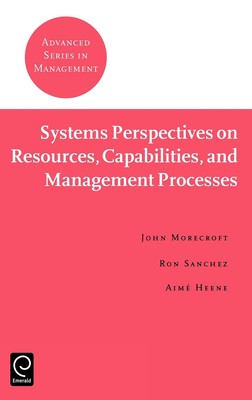
- We will send in 10–14 business days.
- Publisher: Pergamon
- ISBN-10: 0080437788
- ISBN-13: 9780080437781
- Format: 16.5 x 24 x 1.6 cm, kieti viršeliai
- Language: English
- SAVE -10% with code: EXTRA
Systems Perspectives on Resources, Capabilities, and Management Processes (e-book) (used book) | bookbook.eu
Reviews
Description
Traditional notions of stand-alone, "atomistic" organizations are giving way to new concepts about organizations and new modes of organizational interaction. Systems thinking is now becoming an essential skill for managers and management researchers who want to understand new kinds of competitive and cooperative interrelationships between organizations. This volume brings together systems and strategy thinkers to develop a number of systems perspectives and approaches that are essential in managing today's organizations. A main feature of this volume is its careful integration of systems concepts with contemporary strategic management ideas about organizational resources, capabilities, and management processes. The work explains essential systems concepts and their central role in current ideas about organizational competence. Papers in the volume apply systems concepts to: modelling practical management problems; reconceptualizing the nature of organizations and their internal processes; improving managerial sensemaking capabilities in complex environments; devising "simple rules" for reducing and managing organizational complexity. Several case studies and examples are used to illustrate key systems concepts and their application to management practice. The book also provides a solid grounding in essential systems concepts for management researchers developing new management theory for today's complex environments, as well as practical insights for managers who must manage increasing complexity in their organizations today.
EXTRA 10 % discount with code: EXTRA
The promotion ends in 21d.16:42:38
The discount code is valid when purchasing from 10 €. Discounts do not stack.
- Publisher: Pergamon
- ISBN-10: 0080437788
- ISBN-13: 9780080437781
- Format: 16.5 x 24 x 1.6 cm, kieti viršeliai
- Language: English English
Traditional notions of stand-alone, "atomistic" organizations are giving way to new concepts about organizations and new modes of organizational interaction. Systems thinking is now becoming an essential skill for managers and management researchers who want to understand new kinds of competitive and cooperative interrelationships between organizations. This volume brings together systems and strategy thinkers to develop a number of systems perspectives and approaches that are essential in managing today's organizations. A main feature of this volume is its careful integration of systems concepts with contemporary strategic management ideas about organizational resources, capabilities, and management processes. The work explains essential systems concepts and their central role in current ideas about organizational competence. Papers in the volume apply systems concepts to: modelling practical management problems; reconceptualizing the nature of organizations and their internal processes; improving managerial sensemaking capabilities in complex environments; devising "simple rules" for reducing and managing organizational complexity. Several case studies and examples are used to illustrate key systems concepts and their application to management practice. The book also provides a solid grounding in essential systems concepts for management researchers developing new management theory for today's complex environments, as well as practical insights for managers who must manage increasing complexity in their organizations today.


Reviews